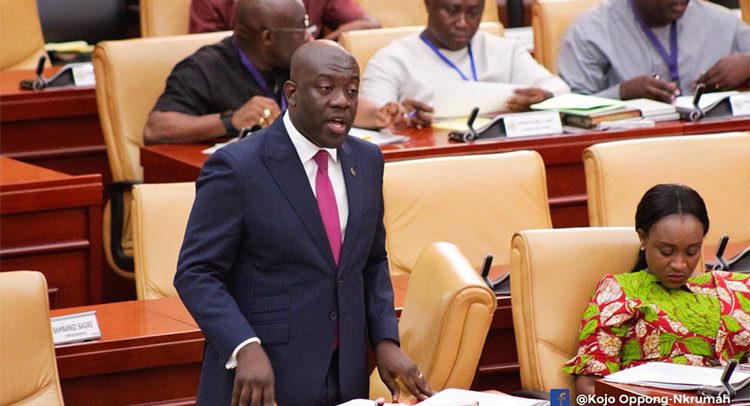Kojo Oppong Nkrumah
Information Minister Kojo Oppong Nkrumah has said violence and misconduct in the chamber of parliament among the political class, have dire consequences on the country’s fortunes.
“The past few months in Ghana’s parliamentary history will go down as some of the most embarrassing. The best example of West African democracy was drowned in regular examples of unruly behavior by honorable members of the house simply because we disagreed on issues. In the chamber from where we were previously praised for our respect for the rule of law and peaceful civil conduct even when disagreed, we are now lampooned as being the example of failed leaders,” he said yesterday when Parliament reconvened.
He said the happenings in the chamber sends a dangerous signal to the populace, saying “conduct like this undermines the idea that Ghana is a peaceful haven in a volatile sub-region. What will we, as MPs say when the youth in our communities resort to violence to settle their disagreements? Will we have the moral rights to call them to order?”
He also said that such conducts “affect global confidence in our economy and the flow of investments into Ghana. This inward flow plays a key role in helping grow our economy. Already, our international rating has suffered a dip. In the recent Fitch downgrade of Ghana’s economy to B- with a negative outlook, one of the strong arguments that was made in the report was though Ghana has a percentile rank above 50 for the respective Governance Indicator, what happened in Parliament has the tendency to impact the country’s credit profile and reduce investor confidence.”
He said “how can we say we want to grow our economy for the benefit of the people, yet be the very ones sending signals to the global investor community that we are unable to manage our own affairs.”
The MP for Ofoase Ayirebi said the “a third challenge is the kind of precedent we set for future parliamentary conduct on how to handle disagreements. While we reminisce in the intellectual brilliance of the JH Mensahs and the Moses Asagas of previous parliaments, we must ask ourselves what sort of legacy of parliamentary conduct are we leaving for the 9th and subsequent parliaments?”
The Information Minister said “for me, the developments in Parliament are not even about the e-levy per se. They are about a new culture brewing in the legislature which must be condemned by all and quickly addressed,” adding “they are about the belief, that it is okay to use violence and physical obstruction to stop parliamentary business from proceeding. This new culture if not checked will spell doom for our democracy and our body politic. If not checked, this culture will characterize all other business in future parliaments. That once members disagree on a matter, violence and obstruction is the way out.”
“We as Members have a responsibility to be civil in our conduct. Yes we can disagree. Yes we will disagree on many matters. But we must be civil in how we express our disagreements and how we resolve them. We should debate our various viewpoints and use the power of reason and persuasion to convince one another. And when we are done we must take a civil vote on which view carried the most of members present and voting.”
By Ernest Kofi Adu


